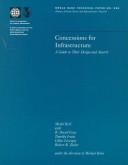| Listing 1 - 10 of 5012 | << page >> |
Sort by
|
Book
Year: 2019 Publisher: Washington, D.C. : The World Bank,
Abstract | Keywords | Export | Availability | Bookmark
 Loading...
Loading...Choose an application
- Reference Manager
- EndNote
- RefWorks (Direct export to RefWorks)
Economic growth in Sao Tome and Principe (STP) has long been driven by an unsustainable reliance on public expenditures, especially grant- and loan-financed public investment. STP needs to turn its smallness into uniqueness to unlock its growth potential. to accomplish this transformation, this image must be matched by a more balanced growth in which the private sector plays a larger role and with a more effective government. Tourism, agriculture, and fisheries could drive the country's transition to a more balanced growth pattern. This Country Economic Memorandum (CEM) highlights six key challenges that STP must overcome as it transitions to a more balanced growth pattern and it offers policy recommendations for addressing each challenge. Accomplishing this rebalancing will require STP to address six key challenges at the macroeconomic, structural, and sectoral level. These include: (i) The twin budget and current-account deficits; (ii) Weak trade connectivity by both air and sea; (iii) Credit constraints caused by a high level of non-performing loans and difficulties enforcing commercial contracts; (iv) Uncertainty surrounding property rights and land tenure; (v) Poor-quality infrastructure, especially in the energy and transportation sector; and (vi) The overexploitation of marine resources.
Book
Abstract | Keywords | Export | Availability | Bookmark
 Loading...
Loading...Choose an application
- Reference Manager
- EndNote
- RefWorks (Direct export to RefWorks)
Book
ISBN: 1509046682 1424468876 Year: 2010 Publisher: New York : IEEE,
Abstract | Keywords | Export | Availability | Bookmark
 Loading...
Loading...Choose an application
- Reference Manager
- EndNote
- RefWorks (Direct export to RefWorks)
Book
Abstract | Keywords | Export | Availability | Bookmark
 Loading...
Loading...Choose an application
- Reference Manager
- EndNote
- RefWorks (Direct export to RefWorks)
Book
ISBN: 9264312633 Year: 2019 Publisher: Paris : OECD Publishing,
Abstract | Keywords | Export | Availability | Bookmark
 Loading...
Loading...Choose an application
- Reference Manager
- EndNote
- RefWorks (Direct export to RefWorks)
This review, developed in cooperation with UNICEF, provides Serbia with recommendations to help strengthen its evaluation and assessment system to focus on support for student learning. It will be of interest to Serbia, as well as other countries looking to make more effective use of their evaluation and assessment system to improve quality and equity, and result in better outcomes for all students.
Book
ISBN: 1614999643 1614999635 9781614999645 9781614999638 Year: 2019 Publisher: Amsterdam, Netherlands : IOS Press,
Abstract | Keywords | Export | Availability | Bookmark
 Loading...
Loading...Choose an application
- Reference Manager
- EndNote
- RefWorks (Direct export to RefWorks)
Book
ISBN: 3748929404 3848788853 Year: 2022 Publisher: Baden-Baden : Nomos,
Abstract | Keywords | Export | Availability | Bookmark
 Loading...
Loading...Choose an application
- Reference Manager
- EndNote
- RefWorks (Direct export to RefWorks)
This volume deals with cross-border infrastructural cooperation during the Second World War. It compares the development of postal services, telecommunications, railways and shipping, and places its findings in the context of the long-term developments of European integration. It therefore calls into question the hitherto dominant assumption that the Second World War signalled a caesura in international cooperation. At the same time, the study shows that cross-border initiatives were undertaken not only in spite of the war, but sometimes precisely because of it. The individual contributions thus also intervene in the debate on 'New Europe'. With contributions by Valentine Aldebert, Claire Aslangul-Rallo, Julia Eichenberg, Pascal Griset, Christian Henrich-Franke, Jiří Janáč, Léonard Laborie, Martinal Libera, Sabrina Proschmann and Guido Thiemeyer.
Book
Abstract | Keywords | Export | Availability | Bookmark
 Loading...
Loading...Choose an application
- Reference Manager
- EndNote
- RefWorks (Direct export to RefWorks)

ISBN: 0821341650 Year: 1998 Publisher: Washington, D.C.
Abstract | Keywords | Export | Availability | Bookmark
 Loading...
Loading...Choose an application
- Reference Manager
- EndNote
- RefWorks (Direct export to RefWorks)
Book
ISBN: 9782884747882 Year: 2018 Publisher: Gollion Infolio éditions
Abstract | Keywords | Export | Availability | Bookmark
 Loading...
Loading...Choose an application
- Reference Manager
- EndNote
- RefWorks (Direct export to RefWorks)
| Listing 1 - 10 of 5012 | << page >> |
Sort by
|

 Search
Search Feedback
Feedback About UniCat
About UniCat  Help
Help News
News